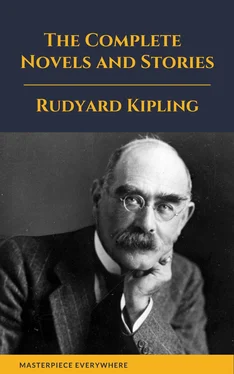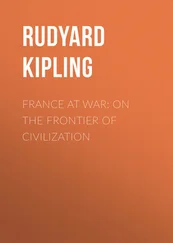‘Fall to, Holy Ones!’ he cried from fifty yards. (They were by the shoal under the first bridge-span, out of sight of hungry priests.) ‘Rice and good curry, cakes all warm and well scented with hing (asafoetida), curds and sugar. King of my fields,’ this to the small son, ‘let us show these holy men that we Jats of Jullundur can pay a service…. I had heard the Jains would eat nothing that they had not cooked, but truly’—he looked away politely over the broad river—‘where there is no eye there is no caste.’
‘And we,’ said Kim, turning his back and heaping a leaf-platter for the lama, ‘are beyond all castes.’
They gorged themselves on the good food in silence. Nor till he had licked the last of the sticky sweet-stuff from his little finger did Kim note that the Kamboh too was girt for travel.
‘If our roads lie together,’ he said roughly, ‘I go with thee. One does not often find a worker of miracles, and the child is still weak. But I am not altogether a reed.’ He picked up his lathi —a five-foot male-bamboo ringed with bands of polished iron—and flourished it in the air. ‘The Jats are called quarrelsome, but that is not true. Except when we are crossed, we are like our own buffaloes.’
‘So be it,’ said Kim. ‘A good stick is a good reason.’
The lama gazed placidly up-stream, where in long, smudged perspective the ceaseless columns of smoke go up from the burning-ghats by the river. Now and again, despite all municipal regulations, the fragment of a half-burned body bobbed by on the full current.
‘But for thee,’ said the Kamboh, drawing the child into his hairy breast, ‘I might to-day have gone thither—with this one. The priests tell us that Benares is holy—which none doubt—and desirable to die in. But I do not know their Gods, and they ask for money; and when one has done one worship a shaved-head vows it is of none effect except one do another. Wash here! Wash there! Pour, drink, lave, and scatter flowers—but always pay the priests. No, the Punjab for me, and the soil of the Jullundur- doab for the best soil in it.’
‘I have said many times—in the temple I think—that if need be, the River will open at our feet. We will therefore go North,’ said the lama, rising. ‘I remember a pleasant place, set about with fruit-trees, where one can walk in meditation—and the air is cooler there. It comes from the Hills and the snow of the Hills.’
‘What is the name?’ said Kim.
‘How should I know? Didst thou not—no, that was after the Army rose out of the earth and took thee away. I abode there in meditation in a room against the dovecot—except when she talked eternally.’
‘Oho! the woman from Kulu. That is by Saharunpore.’ Kim laughed.
‘How does the spirit move thy master? Does he go afoot, for the sake of past sins?’ the Jat demanded cautiously. ‘It is a far cry to Delhi.’
‘No,’ said Kim. ‘I will beg a tikkut for the te-rain .’ One does not own to the possession of money in India.
‘Then in the name of the Gods, let us take the fire-carriage. My son is best in his mother’s arms. The Government has brought on us many taxes, but it gives us one good thing—the te-rain that joins friends and unites the anxious. A wonderful matter is the te-rain .’
They all piled into it a couple of hours later, and slept through the heat of the day. The Kamboh plied Kim with ten thousand questions as to the lama’s walk and work in life, and received some curious answers. Kim was content to be where he was, to look out upon the flat North-Western landscape, and to talk to the changing mob of fellow-passengers. Even to-day, tickets and ticket-clipping are dark oppression to Indian rustics. They do not understand why, when they have paid for a magic piece of paper, strangers should punch great pieces out of the charm. So, long and furious are the debates between travellers and Eurasian ticket-collectors. Kim assisted at two or three with grave advice, meant to darken council and to show off his wisdom before the lama and the admiring Kamboh. But at Somna Road the Fates sent him a matter to think upon. There tumbled into the compartment, as the train was moving off, a mean, lean little person—a Mahratta, so far as Kim could judge by the cock of the tight turban. His face was cut, his muslin upper-garment was badly torn, and one leg was bandaged. He told them that a country-cart had upset and nearly slain him: he was going to Delhi, where his son lived. Kim watched him closely. If, as he asserted, he had been rolled over and over on the earth, there should have been signs of gravel-rash on the skin. But all his injuries seemed clean cuts, and a mere fall from a cart could not cast a man into such extremity of terror. As, with shaking fingers, he knotted up the torn cloth about his neck he laid bare an amulet of the kind called a keeper-up of the heart. Now, amulets are common enough, but they are not generally strung on square-plaited copper wire, and still fewer amulets bear black enamel on silver. There were none except the Kamboh and the lama in the compartment, which, luckily, was of an old type with solid ends. Kim made as to scratch in his bosom, and thereby lifted his own amulet. The Mahratta’s face changed altogether at the sight, and he disposed the amulet fairly on his breast.
‘Yes,’ he went on to the Kamboh, ‘I was in haste, and the cart, driven by a bastard, bound its wheel in a water-cut, and besides the harm done to me there was lost a full dish of tarkeean . I was not a Son of the Charm (a lucky man) that day.’
‘That was a great loss,’ said the Kamboh, withdrawing interest. His experience of Benares had made him suspicious.
‘Who cooked it?’ said Kim.
‘A woman.’ The Mahratta raised his eyes.
‘But all women can cook tarkeean ,’ said the Kamboh. ‘It is a good curry, as I know.’
‘Oh yes, it is a good curry,’ said the Mahratta.
‘And cheap,’ said Kim. ‘But what about caste?’
‘Oh, there is no caste where men go to—look for tarkeean ,’ the Mahratta replied, in the prescribed cadence. ‘Of whose service art thou?’
‘Of the service of this Holy One.’ Kim pointed to the happy, drowsy lama, who woke with a jerk at the well-loved word.
‘Ah, he was sent from Heaven to aid me. He is called the Friend of all the World. He is also called the Friend of the Stars. He walks as a physician—his time being ripe. Great is his wisdom.’
‘And a Son of the Charm,’ said Kim under his breath, as the Kamboh made haste to prepare a pipe lest the Mahratta should beg.
‘And who is that?’ the Mahratta asked, glancing sideways nervously.
‘One whose child I—we have cured, who lies under great debt to us.—Sit by the window, man from Jullundur. Here is a sick one.’
‘Humph! I have no desire to mix with chance-met wastrels. My ears are not long. I am not a woman wishing to overhear secrets.’ The Jat slid himself heavily into a far corner.
‘Art thou anything of a healer? I am ten leagues deep in calamity,’ cried the Mahratta, picking up the cue.
‘The man is cut and bruised all over. I go about to cure him,’ Kim retorted. ‘None interfered between thy babe and me.’
‘I am rebuked,’ said the Kamboh meekly. ‘I am thy debtor for the life of my son. Thou art a miracle-worker—— I know it.[’]
‘Show me the cuts.’ Kim bent over the Mahratta’s neck, his heart nearly choking him; for this was the Great Game with a vengeance. ‘Now, tell thy tale swiftly, brother, while I say a charm.’
‘I come from the South, where my work lay. One of us they slew by the roadside. Hast thou heard?’ Kim shook his head. He, of course, knew nothing of E.23’s predecessor, slain down South in the habit of an Arab trader. ‘Having found a certain letter which I was sent to seek, I came away. I escaped from the city and ran to Mhow. So sure was I that none knew, I did not change my face. At Mhow a woman brought charge against me of theft of jewellery in that city which I had left. Then I saw the cry was out against me. I ran from Mhow by night, bribing the police, who had been bribed to hand me over without question to my enemies in the South. Then I lay in old Chitor city a week, a penitent in a temple, but I could not get rid of the letter which was my charge. I buried it under the Queen’s Stone, at Chitor, in the place known to us all.’
Читать дальше












